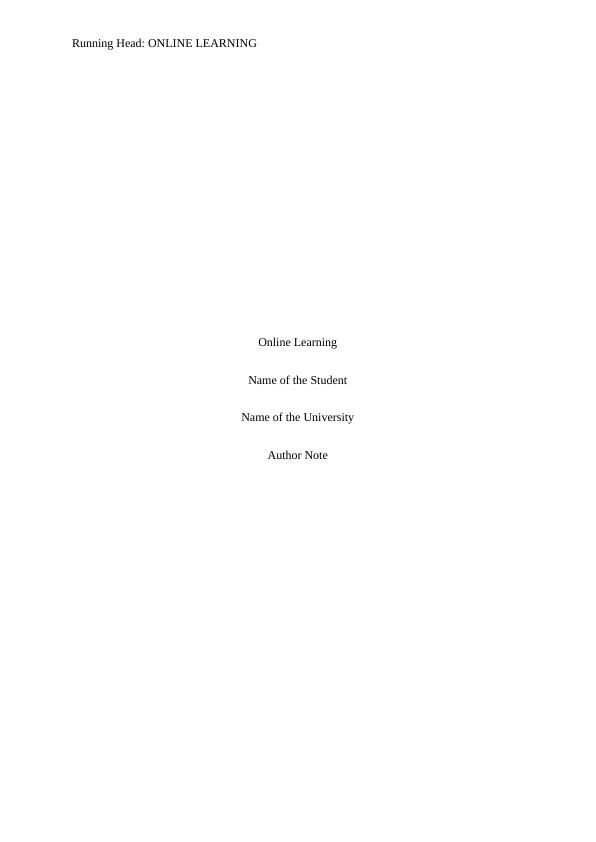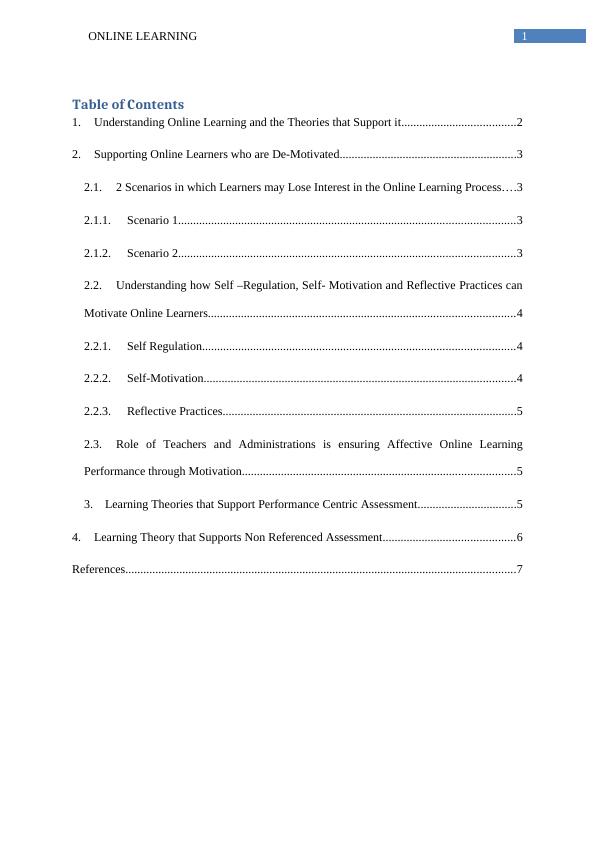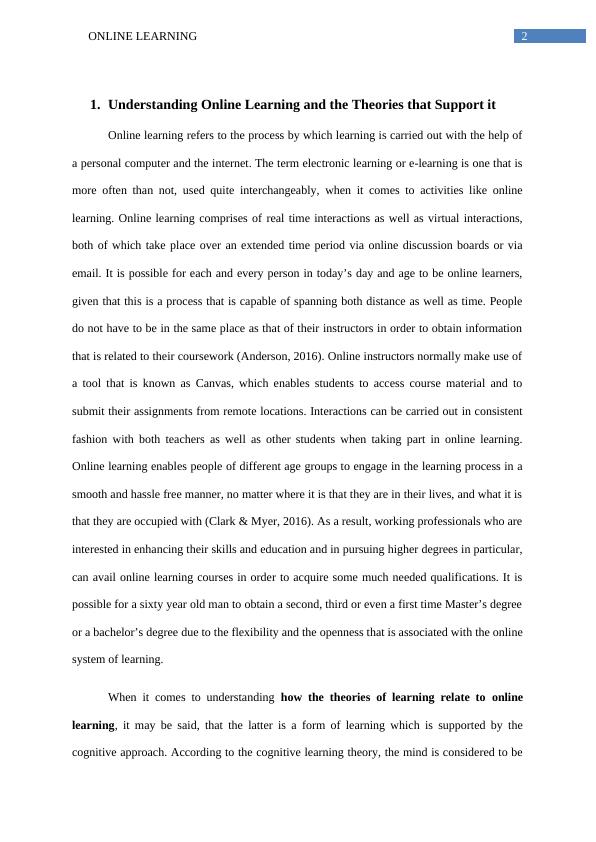Understanding Online Learning and the Theories that Support it
Added on 2023-04-21
9 Pages1909 Words74 Views
Running Head: ONLINE LEARNING
Online Learning
Name of the Student
Name of the University
Author Note
Online Learning
Name of the Student
Name of the University
Author Note

1ONLINE LEARNING
Table of Contents
1. Understanding Online Learning and the Theories that Support it......................................2
2. Supporting Online Learners who are De-Motivated...........................................................3
2.1. 2 Scenarios in which Learners may Lose Interest in the Online Learning Process....3
2.1.1. Scenario 1................................................................................................................3
2.1.2. Scenario 2................................................................................................................3
2.2. Understanding how Self –Regulation, Self- Motivation and Reflective Practices can
Motivate Online Learners......................................................................................................4
2.2.1. Self Regulation........................................................................................................4
2.2.2. Self-Motivation........................................................................................................4
2.2.3. Reflective Practices..................................................................................................5
2.3. Role of Teachers and Administrations is ensuring Affective Online Learning
Performance through Motivation...........................................................................................5
3. Learning Theories that Support Performance Centric Assessment.................................5
4. Learning Theory that Supports Non Referenced Assessment............................................6
References..................................................................................................................................7
Table of Contents
1. Understanding Online Learning and the Theories that Support it......................................2
2. Supporting Online Learners who are De-Motivated...........................................................3
2.1. 2 Scenarios in which Learners may Lose Interest in the Online Learning Process....3
2.1.1. Scenario 1................................................................................................................3
2.1.2. Scenario 2................................................................................................................3
2.2. Understanding how Self –Regulation, Self- Motivation and Reflective Practices can
Motivate Online Learners......................................................................................................4
2.2.1. Self Regulation........................................................................................................4
2.2.2. Self-Motivation........................................................................................................4
2.2.3. Reflective Practices..................................................................................................5
2.3. Role of Teachers and Administrations is ensuring Affective Online Learning
Performance through Motivation...........................................................................................5
3. Learning Theories that Support Performance Centric Assessment.................................5
4. Learning Theory that Supports Non Referenced Assessment............................................6
References..................................................................................................................................7

2ONLINE LEARNING
1. Understanding Online Learning and the Theories that Support it
Online learning refers to the process by which learning is carried out with the help of
a personal computer and the internet. The term electronic learning or e-learning is one that is
more often than not, used quite interchangeably, when it comes to activities like online
learning. Online learning comprises of real time interactions as well as virtual interactions,
both of which take place over an extended time period via online discussion boards or via
email. It is possible for each and every person in today’s day and age to be online learners,
given that this is a process that is capable of spanning both distance as well as time. People
do not have to be in the same place as that of their instructors in order to obtain information
that is related to their coursework (Anderson, 2016). Online instructors normally make use of
a tool that is known as Canvas, which enables students to access course material and to
submit their assignments from remote locations. Interactions can be carried out in consistent
fashion with both teachers as well as other students when taking part in online learning.
Online learning enables people of different age groups to engage in the learning process in a
smooth and hassle free manner, no matter where it is that they are in their lives, and what it is
that they are occupied with (Clark & Myer, 2016). As a result, working professionals who are
interested in enhancing their skills and education and in pursuing higher degrees in particular,
can avail online learning courses in order to acquire some much needed qualifications. It is
possible for a sixty year old man to obtain a second, third or even a first time Master’s degree
or a bachelor’s degree due to the flexibility and the openness that is associated with the online
system of learning.
When it comes to understanding how the theories of learning relate to online
learning, it may be said, that the latter is a form of learning which is supported by the
cognitive approach. According to the cognitive learning theory, the mind is considered to be
1. Understanding Online Learning and the Theories that Support it
Online learning refers to the process by which learning is carried out with the help of
a personal computer and the internet. The term electronic learning or e-learning is one that is
more often than not, used quite interchangeably, when it comes to activities like online
learning. Online learning comprises of real time interactions as well as virtual interactions,
both of which take place over an extended time period via online discussion boards or via
email. It is possible for each and every person in today’s day and age to be online learners,
given that this is a process that is capable of spanning both distance as well as time. People
do not have to be in the same place as that of their instructors in order to obtain information
that is related to their coursework (Anderson, 2016). Online instructors normally make use of
a tool that is known as Canvas, which enables students to access course material and to
submit their assignments from remote locations. Interactions can be carried out in consistent
fashion with both teachers as well as other students when taking part in online learning.
Online learning enables people of different age groups to engage in the learning process in a
smooth and hassle free manner, no matter where it is that they are in their lives, and what it is
that they are occupied with (Clark & Myer, 2016). As a result, working professionals who are
interested in enhancing their skills and education and in pursuing higher degrees in particular,
can avail online learning courses in order to acquire some much needed qualifications. It is
possible for a sixty year old man to obtain a second, third or even a first time Master’s degree
or a bachelor’s degree due to the flexibility and the openness that is associated with the online
system of learning.
When it comes to understanding how the theories of learning relate to online
learning, it may be said, that the latter is a form of learning which is supported by the
cognitive approach. According to the cognitive learning theory, the mind is considered to be

End of preview
Want to access all the pages? Upload your documents or become a member.
Related Documents
Human Resources Services And Managementlg...
|4
|726
|16
Synthetic Statement Assessmentlg...
|4
|710
|17
The Importance and Benefits of Independent Learninglg...
|7
|1513
|356
Psychology Interventions: Summary of Weekly Findingslg...
|4
|663
|84
Theories, Principles and Models in Education for Inspirational Teaching and Learninglg...
|18
|4324
|163
Traditional Classroom Learning vs Online Learninglg...
|5
|1017
|62
